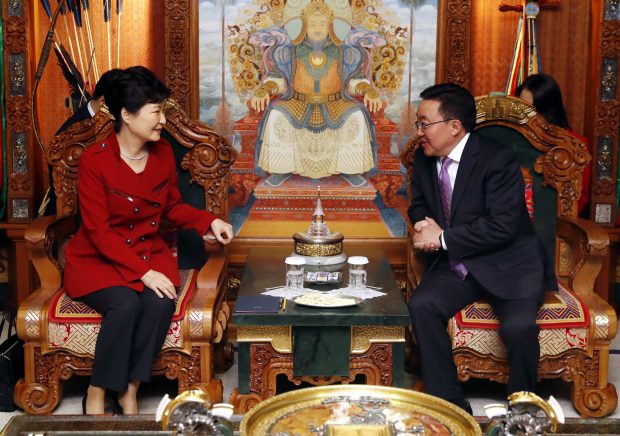[문재인 대통령 취임] 몽골국민들은 한국 촛불시위가 한없이 부럽다

[아시아엔=툴 춘룬바타르 <울란바타르타임스> 전 편집국장] 더불어민주당 문재인 후보가 5월 9일 대통령선거를 앞두고 2위와의 격차를 넓혀가면 1위를 굳히고 있다. 이번 선거는 박근혜 전 대통령의 탄핵을 요구하는 수개월의 걸친 촛불집회의 결과물이다. 국민들의 시위는 성공했고 박근혜 전 대통령은 2017년 3월 10일 탄핵을 당했다.
민주주의가 위협을 받고 있는 몽골에서는 한국의 시위를 지켜보면서 부러움과 동시에 자극을 받고 있다. 지난 몇년 간 민주화운동이 이어져 왔으나 구심점이 없고 정부 역시 무관심으로 일관하고 있다.
아내과 세살짜리 아들을 둔 가장인 냠수렌씨는 한국의 대규모 시위가 성공적으로 이어진 것에 대해 이렇게 말했다. “몽골사람들은 한국의 시위를 통해 배워야 한다. 국민들의 시위는 국가를 위한 것이고, 우리가 정부의 반응을 이끌어 낼 수 있는 유일한 길이기 때문이다. 우리도 행동으로 무언가를 보여주어야 한다.”
지난 겨울 몽골의 수도 울란바토르에서는 매연지수가 WHO 규정의 80배에 달하는 것으로 나타났다. 냠수렌씨는 “우리 아이들 건강이 매연으로 크게 위협받고 있다”며 “그런데도 몽골 정부는 이에 대해 아무런 대응책을 마련하고 있지 않다”고 불만을 토했다. 그는 “둘째 아이를 임신 중인 아내와 뱃속 아기의 건강이 너무 걱정돼 잠이 안 온다”고 말했다.
환경오염에 대한 정부의 미온적인 대처로 국민들 분노가 점점 커지고 있다. 지난 1월 울란바토르에서 열린 집회에 참석한 냠수렌씨는 “공기오염에 대해 정부가 나서라고 촉구하는 것은 국민들의 권리이자 책임”이라고 말한다.
민간 항공기관에서 근무하고 있는 사이카나씨는 냠수렌씨 말에 전적으로 동의한다고 말했다. 사이카나씨는 “한국인들의 행동과 용기가 너무 부럽다”면서 “한국인들이 할 수 있는 것을 우리는 못하는 이유가 뭐냐?”고 물었다.
2016년 6월 29일 국회의원 선거를 앞두고 정부에 대한 몽골 국민의 분노와 좌절은 극에 달했다. 시민들은 2008년과 같은 시위가 또다시 발행할 지도 모른다고 생각했다.
2008년 7월 1일, 국회의원 선거 직후 울란바토르에서 대규모 시위가 일어났다. 이 시위로 몽골 사상 첫 계엄령이 선포되고 군대가 개입했다. 몽골의 국민혁명당 당사에서 불이나 5명이 사망하고 부상자가 속출했다. 체포된 사람이 700명이 넘었다.
몽골은 현재 △경제위기 심화 △높은 실업률 △통화 낙수효과 △부정부패 △환경오염 등에 대한 정부의 미온적인 태도에 국민들의 불만이 팽배해 있다. 지난해 총선이 이전 선거에 비해 낮은 투표율을 보이며 별 파장 없이 끝났지만 국민들의 정부에 대한 불신과 불만은 좀처럼 사그러들지 않고 있다.
국민들 사이에 깔려 있는 정치에 대한 환멸이 극심해 지고 있고 젊은층은 정치참여를 외면하고 있다. 몽골 국립대학교 바야르 교수는 “몽골의 젊은 세대는 정치와 관련해 어떠한 관심도 자극도 없다”고 단정했다. 바야르 교수의 말이다. “몽골인들이 국가에 대해 걱정하느냐고 물으면 답은 ‘물론 그렇다’이다. 그러나 선거철이 다가오면 유권자들은 정당의 정책이나 후보들 간에 차이점이 없다고 생각한다. 어떤 정당에 대해서도 관심이 없는 것이다.”
그는 “우리는 부정부패를 막아야 한다”며 “몽골국민들은 수년간 부정과 부패에 맞서 투쟁해 왔다”고 했다. 바야르 교수는 “부정부패는 국가발전에 심각한 걸림돌”이라며 “정치인들과 사회지도자들은 책임을 통감하고 일반 국민들과 힘을 모아 함께 싸워야 한다”고 말했다. 정부가 국민들의 민심을 읽고 신임을 얻어야 비로소 국가발전이 가능하다는 얘기다.
Mongolia’s Envy of South Korea
By Tuul Chuluunbaatar
South Korean presidential front-runner Moon Jae-in is widening his lead as a May 9 election looms overhead. This early election resulted from months of massive demonstrations calling for the impeachment of President Park Geun- hye over a corruption scandal.
The mass protests were successful; Park Geun-hye was finally impeached on 10 March 2017.
As Mongolia watched the protests, Koreans became a source of envy and inspiration for many who feel that their country’s democracy is under stress. Despite a wave of mobilizations over the last few years, the momentum was not big enough to change situations and there has been a lack of government response.
Regarding the success of South Korea’s mass protests, Nyamsuren Banzragch, an entrepreneur living with his wife and son, says “I think Mongolians need to take a lesson from the South Korea protests. Protesting really worked for their country. I think this is the only way we can get the government to respond and take action.”
Last winter in Ulaanbaatar, the levels of particulate matter in the air have risen to almost 80 times the recommended safety level set by the WHO.
“Our children’s health is in danger from the smog and the pollution. The government is not doing enough,” explains Nyamsuren. His wife is pregnant with their second son and they worry about their children’s future especially regarding their health.
Public anger over the government’s handling of pollution has been growing on social media. Nyamsuren Banzragch felt it was his duty and took part in a rally in Ulaanbaatar this January to demand government action to stop heavy air pollution.
Saikhnaa Batsaikhan, who works at Civil Aviation Authority in the capital, agrees with this sentiment. He said he envied the Korean people for their activism and courage.
“They can do it, why can’t we?” he asks.
Before the parliamentary election on June 29, 2016, anger and frustration towards the government and leaders were high. Many wondered if there would be another riot like the one in 2008.
On 1 July 2008, a riot broke out in the Mongolian capital of Ulaanbaatar after 2008 parliamentary elections. The riot resulted in Mongolia’s first state of emergency, a presence of military, the headquarters of the Mongolian People’s Revolutionary Party was set on fire, five deaths and many injuries, and 700 people were arrested.
Given how unhappy Mongolians are at the government as deep economic crises persist, such as the high unemployment rate, mining wealth not trickling down, the widespread corruption and the government’s inaction over air pollution; this election was still uneventful with low voter turnout compared to previous elections.





